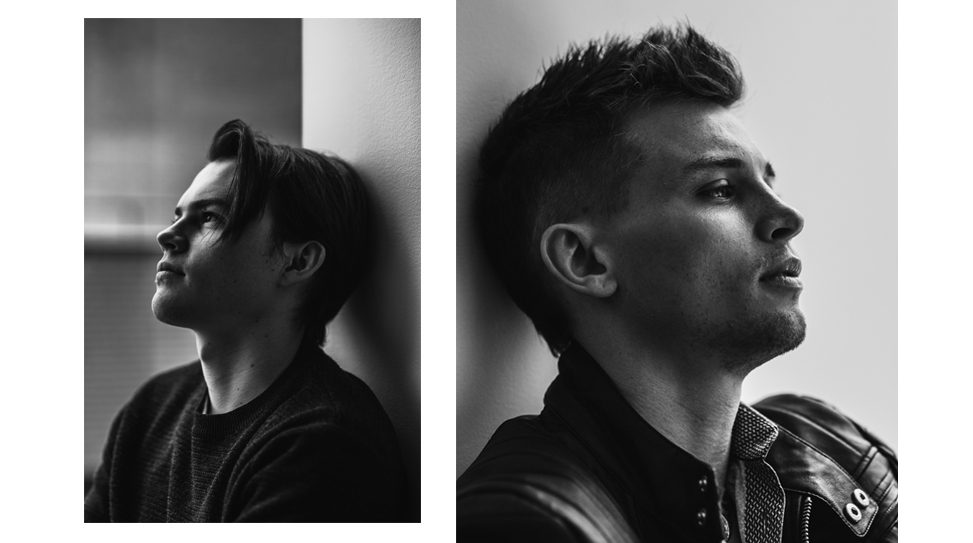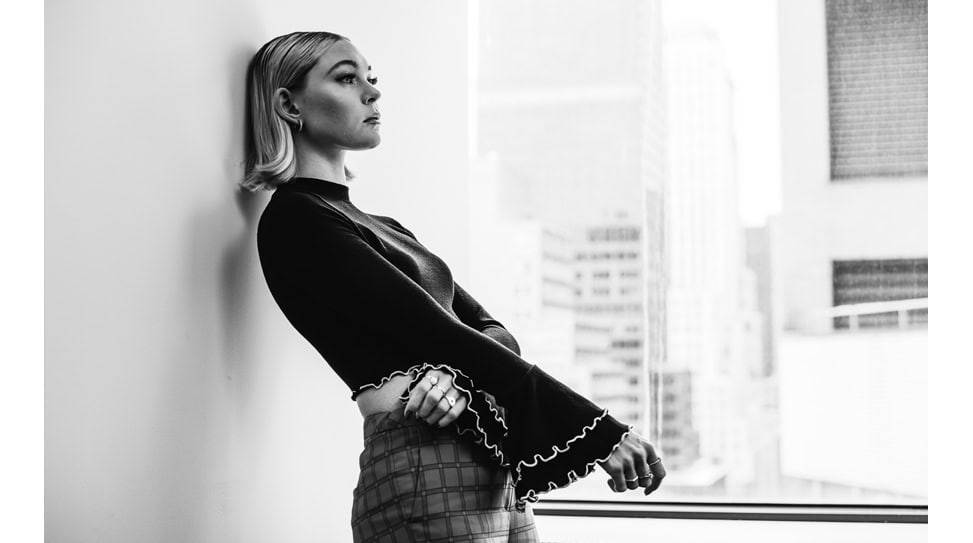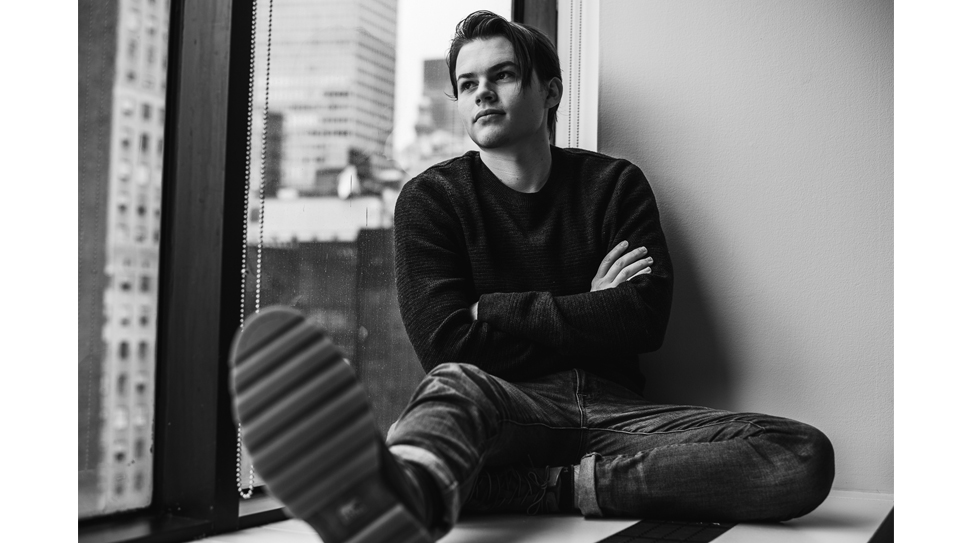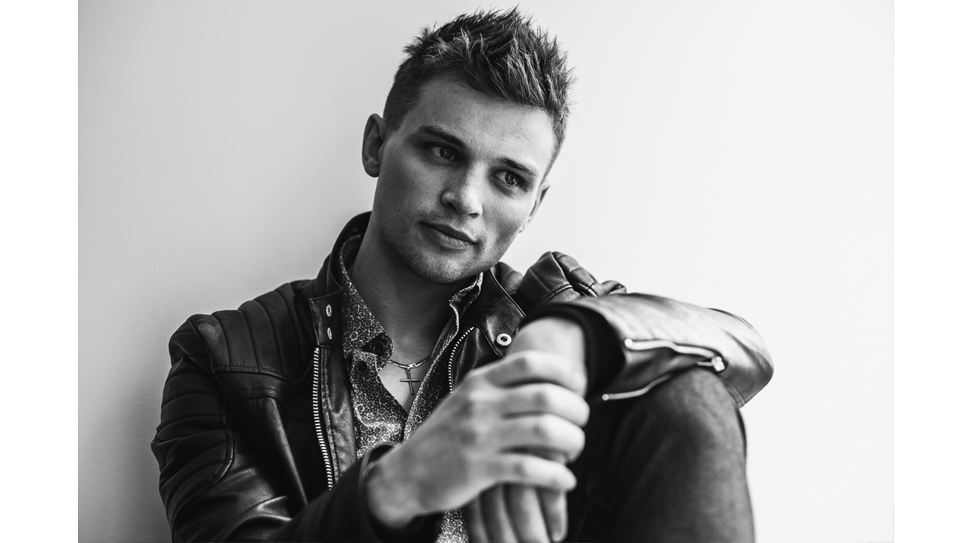What’s a better way to live than just to be able to be you? It’s a pretty awesome way to live, if you can.
Returning to the big screen after a lengthy hiatus, Keith Behrman’s first feature since his decorated 2002 debut Flower & Garnet mounts a passionate and important comeback. Giant Little Ones is a new addition to the coming-of-age, coming-out subgenre that largely avoids feeling like a rote recycling of familiar LGBT+ cinema tropes—flooding its canvas with a coterie of vibrant characters that renegotiate their sexual boundaries on our constantly changing identity spectrum.
Franky (Josh Wiggins) is a popular high school student in suburban Canada who sees his world upended at his 17th birthday party, where he engages in a drunken but reciprocal sexual encounter with his childhood best friend Ballas (Darren Mann). Both having previously identified as straight with girlfriends in tow, their experimentation abruptly throws Franky into the bowels of bullying and social isolation as word spreads that he might be gay. Meanwhile, Ballas grows more and more distant, and even vengeful, as their protracted feud becomes an outlet for a powder keg of repressed feelings. They’re both discomfited by their interlude, but Franky in no small part due to the gnawing memory of his father (Kyle MacLachlan) leaving his mother (Maria Bello) for a man years prior. Franky finds solace in the company of his trans masculine confidant Mouse (Niamh Wilson) and Ballas’s sister Natasha (Taylor Hickson), who’s bullied herself for an unfounded rumor that’s all but destroyed her once thriving social life. In an inspired decision and true to the lives of those who are questioning, Franky and Ballas remain sexually ambiguous on this journey.
Giant Little Ones is now playing in NYC and expands to select cities on March 8th.
Of the many things to appreciate about Giant Little Ones, Franky and Ballas remain undefined in their sexuality throughout the entire narrative, which is so seldom seen in movies and really unexpected.
Josh Wiggins: Yeah, man. As you’re saying, I think the big theme in the movie is the abstract nature of sexuality sometimes. Not bringing it to the forefront adds a lot of layers, complexity, and nuance to the characters that you don’t really see that often in a movie like this.
Darren Mann: Some people ask me whether Ballas is gay, straight or bisexual and I always find that, if I answer the question, it’s kind of doing a disservice to the film. We don’t need to decide what they are—that’s the whole point of the film. We just need to go about our lives, follow our hearts, discover as we go, and not be afraid to be in that discovery phase. I think that’s where Ballas finds himself throughout the film. He’s still trying to figure himself out, you know?
Josh: I think anyone who’s had strife in any relationship that they’ve been in, going beyond this subject matter, can relate to the film. Anyone who has struggled to find their identity—something that a lot of young men and young women go through—can relate to this movie and find some perspective as well.
Taylor Hickson: It’s all part of the human condition.
Darren: I remember back in high school how much you cared about what your peers thought of you, maybe more so for the stereotypical popular guy—the jock. Just putting myself into Ballas’s shoes and into that locker room, it was pretty easy to imagine how he might be feeling.
This movie has been described as “a love letter to gentle masculinity.” You see that vulnerability in Franky. You see it in Ballas, too, maybe more in his private moments of reflection. But perhaps most unexpectedly, you see it in both of their fathers. We don’t often see that extreme tenderness and understanding in grown-up male characters in movies. Was that surprisingly to find on the page?
Darren: I think you hit the nail on the head there. It is pretty surprising and hopefully we’ll see more of this in the future. Young people have come a long way to being more accepting and open, but I think adults still have a long ways to go. I think this movie can help both the younger and older generations. There’s that scene between Josh and Kyle [MacLachlan] at the end, which just about sums it all up.
Josh: Keith [Behrman] said something really interesting yesterday when someone asked him somewhat of a similar question about how we’re seeing more gentle father figures in storytelling nowadays. What Keith said in response was that there’s a growing trend in viewing masculinity in a different light. It’s no longer about showing yourself off, not being emotional, not being vulnerable—there really is a shift that’s happening. It’s very beneficial for males, considering the suicide rates among men and everything else that factors into it. It’s about men feeling comfortable with being vulnerable and being okay about talking about things and—
Darren: Being honest.
Josh: Yeah, being honest. It’s a great shift that’s happening.
Darren: I mean, what’s a better way to live than just to be able to be you? It’s a pretty awesome way to live, if you can.
The film also touches on sexual assault and trans masculinity. Needless to say, there’s a lot going on in this social group—a microcosm of the school. Were these kids recognizable to you from your own high school days?
Taylor: I think most of us tapped into our own personal experiences and our own high school experiences. A lot of the pain and the grief that you see these characters enduring are pieces of our own lives and our own experiences. It was also very collaborative and we built our characters from the ground up. That’s what’s always meaningful to us as actors.
I remember Keith saying that he did a lot of research and talked to high school kids in his preparation so that his vision of youths today wouldn’t feel “antiquated” of “irrelevant”—those are his words.
Darren: He always wanted to collaborate. He wanted to hear what you thought and wanted to work with you. He had an open door. Keith is great at working with different people depending on how they work because, obviously, not every actor works in the same way. I think he worked with all of us very differently. He really catered to what worked best for the each of us.
Josh: That’s what you want in a director.
There was a great moment at the Toronto Film Festival during the post-screening Q&A where a teacher in the audience talked about how much she loved the film and how she wanted to show it to all of her students. You guys must have a lot of people reaching out to you now on social media.
Taylor: Absolutely. People from all walks of life do: people from the LGBT community, people who’ve gone through similar experiences, people who’ve been caught up in rape culture, teachers, and parental figures. The film promotes so many different kinds of love and I think that’s what makes audiences want to empathize and sympathize and connect with it.
This is getting more specific: for his 17th birthday, Ballas gives Franky a flare gun, a tool that’s normally associated with a distress call. It seems to signify something much greater in the context of this film.
Darren: I think you nailed it. It’s usually associated with distress or needing help and we use it for the exact opposite purpose, especially at the end of the story. And not only that, it’s an item that Ballas and Franky both share, which adds another layer to it. It’s first used when everything is fine. Then we use it on the night of, right?
Josh: Yeah.
Darren: The night it happens. So when Franky uses it at the end to say, “Hey, I’m okay,” it’s him saying that but it’s also him letting Ballas know that he still loves him. There’s a lot of meaning behind those flares.
Taylor: Honestly, I think the flares mean something different for every viewer. It’s very open to interpretation and Keith set that up perfectly. That’s also why it’s so beautiful to have the flares go up on opposite ends of the film.
Josh, I know that Allison Black [Behrman’s producer] had seen you in Hellion and that’s how this project sort of entered your orbit. So did they reach out to you with an offer or did you end up having to audition for this lead role?
Josh: You’re right, she did discover me in Hellion, but we had worked together prior to this on a film called Mean Dreams. So I knew her and her husband [Mean Dreams director Nathan Morlando]. Allison’s a very good saleswoman.
Taylor: [Laughs]
Josh: When I was in L.A., she pitched the story for Giant Little Ones to me and I immediately responded to it. It felt like there were so many moving parts and nuances to the story. She sent me the script and said, “If you don’t like it, it’s totally fine. There’s no pressure!” Then I read it and I immediately wanted to do it. I signed on and then me, Darren, and Taylor did chemistry reads for what seemed like—
Darren: It took a few months.
Taylor: Oh yeah, but the entire auditioning process to me being signed on took close to two years. It was like a year and a half of myself and Darren being looked over very thoroughly.
Darren: [Laughs] Did you also start with a tape?
Taylor: Yeah, I started with a self-tape. Then we did chemistry reads. I know we all had one together, but I started having coffee meetings whenever Keith was in town or Allison was in town. A lot of it didn’t have to do with the script itself. Keith and Allison both wanted to get to know us as people, which was something foreign to me in the casting process. I think that’s one of the reasons why our film is so special.
Keith said something that really struck me as important: “We’d like to think it wouldn’t be a problem for a young man to take on these roles, but it is, even now.” He was of course talking about male actors taking on gay roles, specifically. Darren, I don’t mean to put you on the spot, but is there truth to what he’s saying? You also play a gay character on Chilling Adventures of Sabrina.
Darren: Yeah, someone asked me about that the other day, too. For me, I don’t even look at sexual orientation when I’m trying to decide on roles. I’m just looking to see if it’s a good role and if I like the material and what the character is like. Really, the least of my concern is what the character’s sexual orientation is. Is the role good? Is the project good?
Taylor: That’s not always common, though.
Darren: Yeah, there’s a lot of fear that that’s how you’re going to be perceived, I think. People will want to project a certain image or a certain gimmick with who they play.
Taylor: People have asked me that, too, because I’ve played gay characters. Someone legitimately asked me, “Aren’t you afraid of looking gay?” What’s there to be afraid of? I’m aware of who I am and it’s no one else’s business. Two years ago, another actor told me that he had stopped going to the gay pride parade because he was afraid how he would be perceived. So it is rare. It is more rare than you think that people are willing to take on gay roles.
Darren: Well, I like it. Then there are more chances of me taking them on. Less competition!
Taylor: [Laughs]
Josh, Kat Candler credits herself for discovering you on YouTube when you were creating content on there. She cast you in your first acting role in Hellion. Were you an aspiring actor at that point?
Josh: Not really. I just knew that I wanted to be in that creative space. I actually always imagined being a director, and when I saw what directors have to do, I thought, “Then I’ll hope for now!” [Laughs] The videos that we made were for fun, not really anything crazy. It was basically us recording and goofing off. Then Kat contacted us and asked if we wanted to audition and that was a long process, too. We didn’t expect to get it or anything, but when we did, it snowballed from there. It’s been an interesting experience, for sure.
Taylor, I believe you started out singing on a talent competition at a really young age.
Taylor: I always wanted to be in the entertainment arts, but music was my first love. I never really intended to get into acting, but a family friend told me that this agent was looking for teenagers on his roster. I said, “I don’t know how to act,” and he said, “It doesn’t matter. If you’re ever in the city, come see us.” I lived four hours away. I was like, “I never go there.” Then that week, my sister ended up having a soccer tournament in their city so I went and auditioned, and he signed me that day. I was driving four hours to and from every audition, three or four times a week. I didn’t even know what I was getting myself into. I didn’t know what acting was. For the first thing I ever did, I paid someone to drive me down to Vancouver and it was a Talking Peanut commercial. I didn’t even know what I was doing, but it worked out!
What about you, Darren?
Darren: So I was a little shy as a kid. My mom was in the industry and when I was 8, she decided to put me into an acting class to try and get me out of my shell. It seemed to work pretty well and I enjoyed it. I kept it going until I was around maybe 13 or so and then dipped away because I wanted to be a hockey player. Acting was always in the back of my mind and when the day came that I couldn’t be a hockey player any longer, I realized it might be something that I would look into. When I was done playing hockey, I talked to an acting school and to the Air Force, and I picked the acting school. And here we are.






 A Conversation with Sean Wang
A Conversation with Sean Wang A Conversation with James Paxton
A Conversation with James Paxton
No Comments